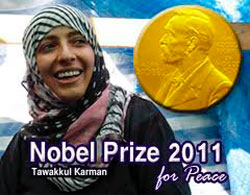Tawakul Karman: Nobel Peace Prize Laureate
 |
In 2009 I had the privilege to spend two weeks with Tawakul Karman, the 2011 Nobel Peace Prize recipient along with Ellen Johnson Sirleaf and Leymah Gbowee. We traveled the United States visiting grassroots communities in a study tour on 'religion and society' for a program I directed for the National Peace Foundation. Tawakul, and her husband Mohamed Al-Nehmi, her supporter and co-activist, joined a delegation of Arab international activists and scholars as observers of the religious landscape of America. I had invited Tawakul and Mohamed to the U.S. when I visited Women Journalists Without Chains in Sana'a, the Yemeni non-governmental organization (NGO) advocating for freedom of the press which Tawakul had founded.
I found Tawakul to be an open book. She is a Yemeni Muslim woman who actually is not at all unconventional as she may have been depicted recently. Rather she is quite socially conservative. However, she is extraordinary in her leadership. She holds a position on the central committee of Yemen's major political Islamist opposition party, the Islah (Reform) Party. Her brilliance is in her determination, her unceasing demand for the rights of citizens; all Yemenis, all Arabs and the entire world, to truly enjoy freedom of speech, freedom of press and freedom of association. The simplicity of her message is crystal clear, but her courage is to stand up and stand out so publicly in Yemeni society where she has transformed the image of a Muslim and Arab woman into an icon for change. She has become the face of Yemen's pro-democracy revolution with photo placards and pink posters decorating the daily protests and sit-ins in Sana'a's Change Square. Since the announcement of the Nobel Peace Prize, most of Yemen's citizens are ecstatic with pride and she has been further honored as "the Mother of Yemen's Revolution."
Tawakul was among those who ignited Yemen's anti-government protests in early 2011. However she did not just start on February 3rd, the Day of Rage, but throughout the year before she had led weekly protests at the Girl's College of Sana'a University demanding women's rights and freedoms. Since 2007, even before Tunisia and Egypt, Tawakul's was a non-violent movement. She organized and led demonstrations of media professionals against censorship and for the right to create a free radio station. The government usually responded with violence, initially showing some restrain by not beating her directly. She told me that it was her husband, Mohamed, who readily agreed to take the blows instead of his wife by walking before her in the demonstrations. Despite the peace movement, Tawakul was arrested for inciting protests, but continued unabated after she was released. Unfortunately, at this time the violence is extremely bloody and hundreds of activists have been shot dead by government forces. For several weeks Tawakul has been sitting in a tent in Sana'a Square witnessing and reporting on the deaths and injuries.
Our travel in the U.S. was organized as visits to grassroots communities and organizations that were examples of the pluralism of America's religious landscape; i.e. churches, mosques, synagogues and groups and activists associated with houses of worship. The Muslim world, even Yemeni activists like Tawakul, do not have a true picture of the diversity of America's religious institutions and their capacity for social and political impact. Tawakul had visited the U.S. before, but said she had returned home in tears, never finding examples of the American values she adored; freedom and justice. On our trip, she said she found it in grassroots America and realized the commitment and sacrifices of involved American activists. She said she yearned for Yemen's civil society, a comparatively flourishing movement in the Arab world, to dig as deep into engaging its citizenry.
During our talks Tawakul reflected that she had never been to, let alone attend a service, at a Jewish synagogue before participating in a Purim celebration at Beth El Synagogue in St. Louis Park, Minnesota and held a discussion with 7th and 8th graders at the Minneapolis Jewish Day School. She said she was touched and amazed at the warm welcome in a place where she expected hostility. At a meeting at Dar Al Hijra Mosque in Minneapolis, in an honest discussion with the American Somali community, Tawakul admitted that she had never shown concern for the situation of Somali refugees in Yemen, where sometimes bodies wash up on Yemen's shores of those who didn't survive smuggler's boat trips across the Gulf of Aden. While another of her journalist colleagues said that Yemen was a poor country and could not afford to take care of refugees, Tawakul said she would investigate and write of the Somali refugee plight.
After two days in Eau Claire, Wisconsin, a small town in America's heartland, Tawakul broke down in tears. She said she had not expected for the Qur'an to be recited at United Church of Christ, for a French gourmet, halal meal to be served by teens at the Valleybrook Church to her, and to find civic groups meeting to create a peace coalition in the basement of the Islamic Society of Northern Wisconsin, a small mosque serving 60 families. She said these observations of what it takes to create democracy and coexistence had been impressed on her soul.
Tawakul is the idealist extraordinaire. She talks the talk and walks the walk and screams at the top of her lungs for justice. The proof is the footage of her doing so on the Arab TV for the last several years. Her values are not just beliefs. They are the essence of her being, compelling her to live a life of protest. Her support comes from many around her, but the first and most obvious is her husband. Mohamed supports his wife with great pride encouraging her forward, not just willing to be a follower, but asking her to lead. I heard Mohamed joke many times that Tawakul will be the first woman president of Yemen, and a just and effective one. Now as her leadership is being recognized internationally, it may no longer be just joking around.
Tawakul is a humble woman, choosing to dress simply and modestly. She wears long overcoats and at one time she wore the face veil willing until she just took it off. She said that she was about to address an audience when she realized that it was in the way and needed to go. Tawakul, in her role as advocate for women's right, does not advocate for women to remove the face veil. She said this focus diverts from priorities. Instead she advocates for women to be able to do as they wish.
Tawakul has touched my heart with her humility. On our tour, during a panel presentation on democracy in the Arab world at the University of Wisconsin-Eau Claire, where the delegation was greeted by the Chancellor and the student body president, Tawakul walked off stage in frustration saying that she could not do justice to represent Yemen and its people. Today, as a recipient of the Nobel Peace Prize, it is clear that she can be a voice for Yemen, for the Arab world and for Muslim women worldwide.
Yet Tawakul believes she is "of the people and for the people." Her reaction to the Nobel announcement was exactly as I expected as I have come to know her. In the simplest of Arabic she said: "I give the prize to the Arab revolutions and to the peaceful youth revolution in Yemen and the Yemeni people. I also dedicate this prize to the martyrs and wounded people from all the peaceful revolutions."
*****
Sahra Taman is the Co-founder of Journeys to Understanding
Source: The Huffington Post
Topics: Conflicts And War, Freedom Of Speech, Human Rights, Nobel Peace Prize, United States Constitution, Yemen
Views: 5908
Related Suggestions

















